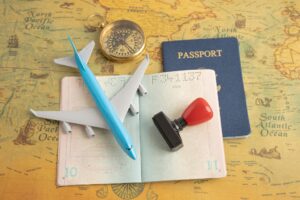Canada has become one of the most sought-after destinations for skilled professionals, students, and families from India who aspire to build a new life abroad. The Canadian government offers several pathways to obtain Permanent Residency (PR), such as the Express Entry Program, Provincial Nominee Program (PNP), and family sponsorships. Regardless of the chosen route, documentation plays a pivotal role in determining the success of your PR application. This blog provides a comprehensive guide on the documents required for Canada PR from India, ensuring your application is thorough and organized.
1. Passport
A valid passport is the most fundamental document required for your PR application. Each applicant, including dependents, must possess a valid passport. Ensure that your passport has sufficient validity, ideally beyond the expected completion of the immigration process, to avoid any interruptions.
2. Educational Credential Assessment (ECA)
For most economic immigration programs like Express Entry, you need to prove that your foreign education is equivalent to Canadian standards. Organizations such as World Education Services (WES), International Qualifications Assessment Service (IQAS), and others are authorized to provide ECAs. This process involves submitting your academic transcripts and certificates for verification.
Key Points:
- Ensure the ECA report is obtained from an authorized body.
- Retain copies of your original educational documents and ensure accuracy in the provided details.
3. Language Proficiency Test Results
Canada’s immigration programs require proof of proficiency in English and/or French. The commonly accepted tests include:
- IELTS (International English Language Testing System): General Training test is required for immigration purposes.
- CELPIP (Canadian English Language Proficiency Index Program): General Test is also accepted.
- TEF Canada (Test d’Évaluation de Français): For French proficiency.
Ensure your test scores meet the minimum requirements for your chosen program. Test results are valid for two years, so plan accordingly.
4. Proof of Work Experience
Work experience is a critical factor in most PR programs. To prove your professional experience, gather the following documents:
- Reference Letters: These should include your job title, roles and responsibilities, salary, and duration of employment. Ensure that they are signed by your employer.
- Payslips and Employment Contracts: Additional proof to support your reference letters.
- Tax Documents: Income tax returns or Form 16 can substantiate your claims.
5. Proof of Funds
You must demonstrate that you have adequate financial resources to support yourself and your family upon arriving in Canada. The amount varies depending on the number of dependents accompanying you. Acceptable proofs include:
- Bank account statements (last 6 months).
- Fixed deposits or investment statements.
- Letters from financial institutions confirming account details and balances.
Ensure your funds are readily accessible and not tied to assets like real estate.
6. Medical Examination
All PR applicants must undergo a medical examination conducted by a panel physician approved by Immigration, Refugees, and Citizenship Canada (IRCC). The examination ensures you do not pose a health risk to Canadian society.
Documents Required for Medical Examination:
- Valid passport.
- Medical history records (if applicable).
- Recent photographs (as per the physician’s requirements).
7. Police Clearance Certificate (PCC)
A PCC verifies that you have no criminal record in your home country or any country you’ve resided in for more than six months after turning 18. Indian applicants can obtain a PCC from:
- The local police station.
- Passport Seva Kendra (PSK).
Ensure that your PCC is recent, as it remains valid for a limited time.
8. Marriage or Divorce Certificates (If Applicable)
If you are married, you must provide a marriage certificate as proof of your relationship. Similarly, if you are divorced or widowed, you will need to submit the relevant certificates to confirm your marital status.
9. Birth Certificates or Adoption Papers for Dependents
For applicants with dependents, birth certificates or adoption papers are required to establish the relationship between the principal applicant and the dependents.
10. Photographs
Applicants must submit recent photographs that meet the IRCC’s specifications. These are usually required for medical exams and visa stamping.
Key Specifications:
- Clear, high-resolution photographs.
- Neutral background.
- Dimensions as per the Canadian immigration guidelines.
11. Proof of Relationship to Canadian Residents (If Applicable)
If you are applying under the Family Sponsorship Program, you will need documents such as birth certificates, adoption records, or marriage certificates to prove your relationship to the Canadian citizen or PR sponsor.
12. Additional Documents for Provincial Nominee Programs (PNPs)
Applicants applying under a PNP must provide additional documents specific to the province. These may include:
- Provincial nomination certificate.
- Intent to reside in the province.
13. Job Offer Letter (If Applicable)
If you have a valid job offer from a Canadian employer, include the offer letter in your application. Ensure the job offer complies with the requirements of the immigration program you are applying under.
14. Travel History
A detailed travel history, including all the countries you’ve visited, is often required. This helps IRCC assess your background and ensures transparency in your application.
15. Letter of Explanation (Optional)
If you need to clarify any aspect of your application, such as gaps in employment or missing documents, a Letter of Explanation can be included. This is not mandatory but can strengthen your application if used appropriately.
Tips for Organizing Your Documents
- Create a Checklist: Use the IRCC’s official checklist to ensure you include all required documents.
- Scan and Save Electronically: Maintain digital copies of all your documents in high resolution.
- Translate Non-English Documents: If any document is not in English or French, provide a certified translation.
- Verify Document Validity: Check expiration dates on test results, PCCs, and medical reports.
- Use a Professional Consultant (If Needed): Immigration consultants can help you navigate complex requirements and ensure your application is complete.
Conclusion
Obtaining Canada PR from India requires meticulous preparation and submission of accurate documentation. By following this guide and staying organized, you can enhance your chances of a smooth and successful application process. Remember to keep track of deadlines, maintain open communication with relevant authorities, and stay informed about changes in immigration policies. With proper planning, your dream of becoming a permanent resident of Canada can soon become a reality.




